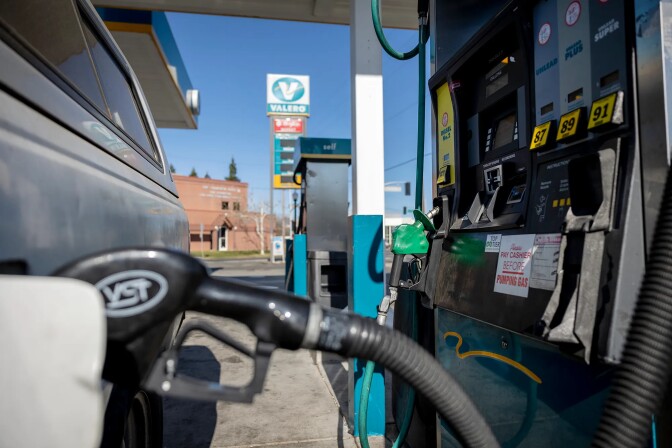To help with the high price of gas — and the rising cost of living — California started sending payments ranging from $200 to $1,050 to residents in October.
Whenever money might be headed to people’s bank accounts, they tend to have questions.
We’ve already answered the basics, including who is eligible for the payments, when they are getting sent out, how people will receive them, and how much you can expect to receive.
But readers responded with more questions via email and social media. We also took cues from questions people searched for a lot online. We’ve answered some of those questions here, and will be adding more questions and answers to this page over the coming days.
Does it matter how many cars I have, or whether I have an electric vehicle?
No. Whether or not you’re eligible for this payment — or how much you will get — has nothing to do with whether you own a car, how many cars you own, or what kind of car you own.
The reason people might be confused is that back in March, Gov. Gavin Newsom proposed sending payments to Californians based on how many cars they own. But that wasn’t part of the final deal.
Eligibility is based on having submitted a complete 2020 tax return by Oct. 15, 2021, as well as other factors including income and residency.
Are the “gas rebates” the same as the “inflation relief” payments?
Basically, yes.
The idea of financial relief for high gas prices was floated by Newsom in March. As the proposal developed it was sometimes referred to as a gas rebate or refund, and sometimes referred to as an inflation relief payment. The official name it ultimately got was the “‘Middle Class Tax Refund.” In most cases, those terms are all referring to payments that started going out in October to offset the high price of gas and other goods.
One wrinkle: In the wake of a recent uptick in the price of California gas, Newsom proposed a new tax on oil companies in late September and called for a special legislative session in December to discuss the idea. His proposal is to turn the funds generated from that tax into a refund or rebate for people affected by high gas prices, so that’s another gas rebate you might hear about, but it hasn’t happened yet.
Are these payments taxable?
The payments won’t be taxable for California state income tax purposes, says Franchise Tax Board spokesperson Catalina Martinez. Martinez said the board would be issuing 1099-MISC forms to people receiving payments of more than $600.
Whether the federal government will tax these payments is less clear. “That’s an issue where individuals should check with your local tax preparer,” said H.D. Palmer, spokesperson for California’s Department of Finance.
Why can’t you file something now to get the payment if you didn’t file a 2020 tax return?
Some people earn little enough income that they aren’t required to file taxes. That includes some seniors and disabled people, as well as some very low income people. Unfortunately, if you didn’t file a 2020 tax return by the deadline, you aren’t eligible for this payment.
You can’t file anything retroactively to receive the payment.
If the state allowed people to file amended tax returns, for example, that would have taken more time — both for people to file, and for the state to process — and would have opened up “concerns regarding potential fraud,” said Palmer.
Basing the payments on previously submitted returns, and documentation that has “already been processed and validated by the [Franchise Tax Board] significantly eliminates the possibility of fraud,” Palmer said.
Why is your 2020 tax return important? Why not 2021?
There are two main reasons why the 2020 tax return was chosen, Palmer said. One is that the 2020 tax filing is completely done, whereas tax filing and processing for 2021 is still ongoing. (The extension deadline for 2021 tax returns was Oct. 17).
The other reason, Palmer said, is that the tax board “received roughly half a million more low-income tax returns than usual in 2020, since more households filed tax returns to take advantage of pandemic-related assistance.” So, by using the 2020 return, California will be able to reach several hundred thousand more people with these payments, according to Palmer.
What happens if you were married when you filed your 2020 tax return and filed it jointly, but have since gotten divorced?
Your tax return for 2020 is important for these payments — without one, you aren’t eligible. Plus, the adjusted gross income reported on your 2020 return will factor into how much money you get. The payments are being sent out either as direct deposits or debit cards.
If you were part of a couple that filed a 2020 tax return jointly, but have since separated or gotten divorced, you will still be issued one debit card jointly with your former spouse or partner, with both names on it, said Martinez. That card would be sent to the most recent address the tax board has on file for the first person named on the 2020 return.
If your address has changed since you last filed California taxes, you can update your address through MyFTB or by phone, dialing 1-800-542-9332 according to Martinez.
Same goes for direct deposit: If you filed a 2020 tax return with a partner or spouse you’ve since separated from, the deposit will go to the bank account of the first person named on the 2020 tax return, Martinez said.
In this situation the formerly coupled taxpayers “should work together to ensure proper handling of the (Middle Class Tax Refund) payment,” said Martinez in a statement.








